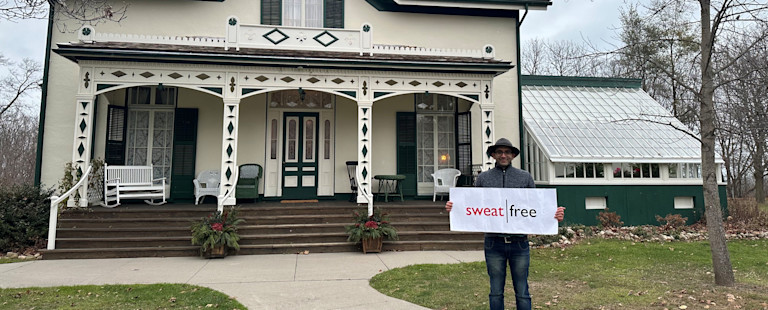Founder Spotlight: Chanakya Ramdev, founder of Sweat Free Telecom
Some founders build one company. Chanakya Ramdev has built three—without ever changing the name. Through every pivot, Sweat Free has remained constant. What started as a textile innovation to protect office wear in Hong Kong’s humid climate evolved into a pandemic-era face coverings company, and now, into a telecommunications startup helping people stay connected when it matters most.

Ramdev’s journey began while he was completing his engineering degree at the University of Waterloo. During a co-op placement working for UW in Hong Kong, he found himself drenched in sweat each day under a mandatory three-piece suit.
“Since I was representing the University, I had to be in a suit. I would wear a three piece suit, but Hong Kong is hot and humid, so I would arrive at work drenched in sweat, and over the time I was there, I ruined all of my suits,” he says with a laugh.
To solve the problem, he designed an inner liner that could be worn under formal clothes so outer garments wouldn’t get ruined. The liner became the core product for his first startup, Sweat Free Apparel.
Pivoting through the pandemic
When COVID-19 hit and the demand for office wear disappeared, Ramdev quickly pivoted.
Using the same moisture-blocking technology, he developed high-performance face coverings. Sweat Free supplied face coverings to Metrolinx and clients in the Government of Ontario.
But as global production of disposable masks ramped up, something else happened.
“In the beginning there was a shortage of masks, but by the end, there was overproduction. Billions and billions of those blue disposable masks ended up in lakes and rivers,” Ramdev says.
Seeing the environmental damage led him to another evolution. Ramdev and his team built an autonomous electric cleanup boat he describes as a “Roomba for lakes “ to collect floating debris like masks, plastics and oil sheen.
The autonomous electric cleanup boats were connected to the internet using cellular radios.
As fate would have it, a national outage would lead Ramdev to yet another pivot.
During the 2022 Rogers Communications outage that knocked phones offline for hours, Sweat Free’s cleanup boats were still deployed. Ramdev hadn’t built for a world where a national carrier could just go dark.
“We never thought a major network would go down. That showed us we needed redundancy,” he says.
Ramdev rebranded the company to Sweat Free Telecom to offer users a redundant network that automatically activates when their primary carrier suffers an outage. Using a single eSIM, a phone can connect to multiple carriers without needing to insert a new SIM or activate another eSIM.
“It’s like a spare tire for your phone. You don’t need it every day, but when you do, you’re glad it’s there,” Ramdev says.
It also works across borders like an eSIM, helping avoid roaming fees in other countries. The benefits go beyond redundancy. The eSIM doesn’t expire, and users only pay for the data actually used.
That model has resonated with users who need always-on connectivity—emergency management, business continuity, emergency preparedness, and disaster recovery teams inside enterprises and government. For those teams, “backup network” isn’t a nice-to-have. It’s insurance.
“These are the people whose job it is to keep the organization running if there’s a disruption. If their communications go down, the entire operation goes down. So connectivity is actually a safety issue,” he says.
Getting help from the AC
After developing the core technology for Sweat Free Telecom, Ramdev joined AC:RevLab, the Accelerator Centre’s sales and growth program designed for technical founders. Ramdev says it was just what he needed.
“Sales and marketing were new to me,” he says. “The mentors helped us identify our ideal customer profile and refine our messaging. Their advice directly led to our first B2B deal.”
Mentorship was a game-changer. Ramdev credits Kevin Hood for his guidance on B2B strategy, Lisa Dakin-Bartels for sharing compliance and industry insights, and Ellyn Winters-Robinson and Hannah Lau for support with messaging and public relations. He also gives special recognition to John Beresford, who runs the RevLab program.
“John is amazing. He organizes weekly calls with all of us to keep everyone accountable, and that level of consistency makes a huge difference. Before RevLab, I was basically winging it in big-company meetings. Now I have structure and proof that I can use to close a sale,” Ramdev says.
He also appreciated the program’s flexibility. The initial workshops were held in person, followed by virtual sessions to make participation easier for founders outside Waterloo Region. Mentor meetings were customized to each company’s stage and goals.
“They didn’t force everyone into the same box. They met us where we were.”
Learning to listen to the market
After three pivots, Ramdev has learned that success comes from paying attention to what customers actually need.
“The reality is we don’t get to decide what our customers want. They do. You can present any idea you want, but the market decides. When the market gives you feedback—good or bad—it’s in your best interest to listen,” he says.
That adaptability has kept Sweat Free moving forward from apparel to environmental tech to resilient connectivity.
And through it all, one name—and one tenacious founder—have stayed the same.